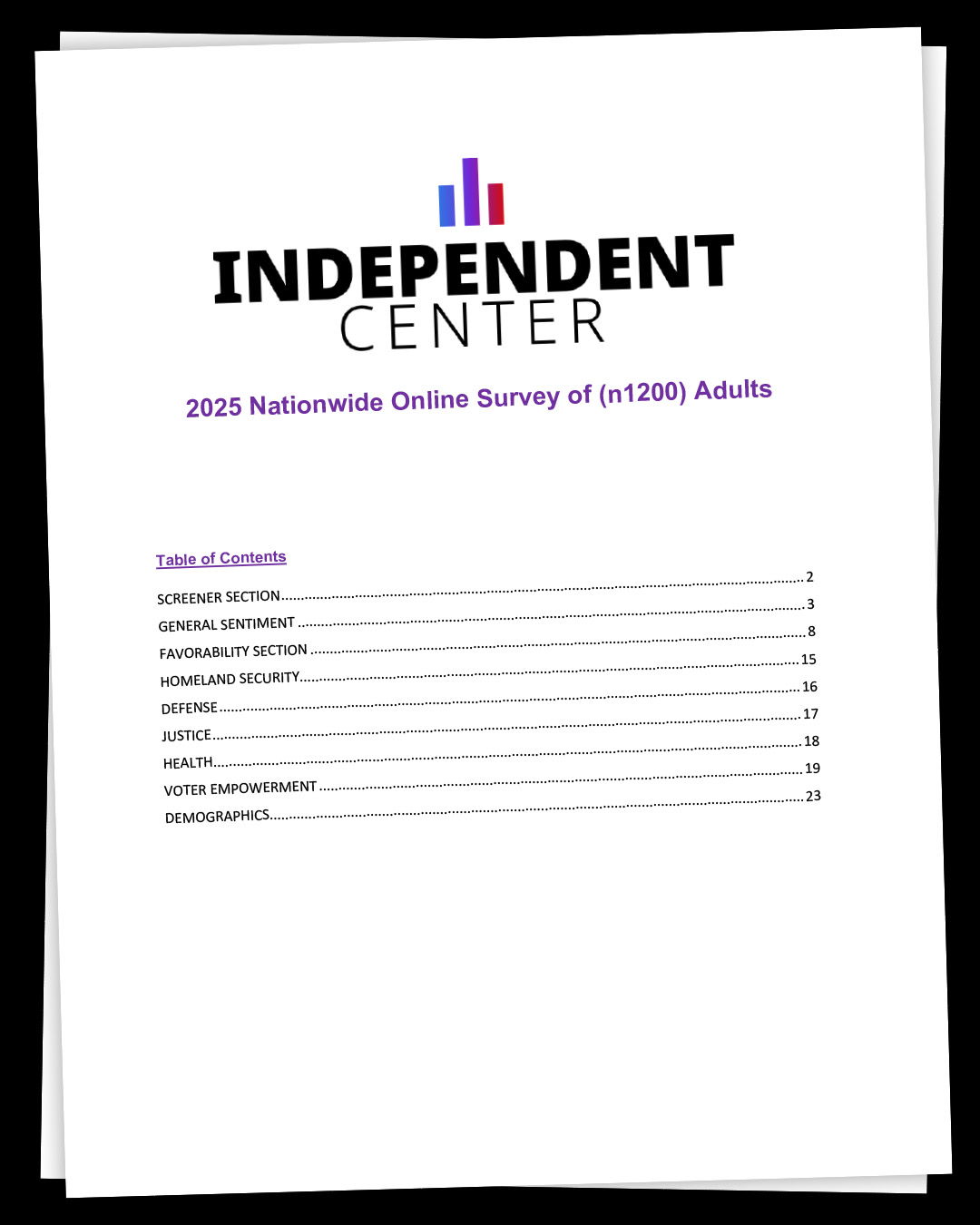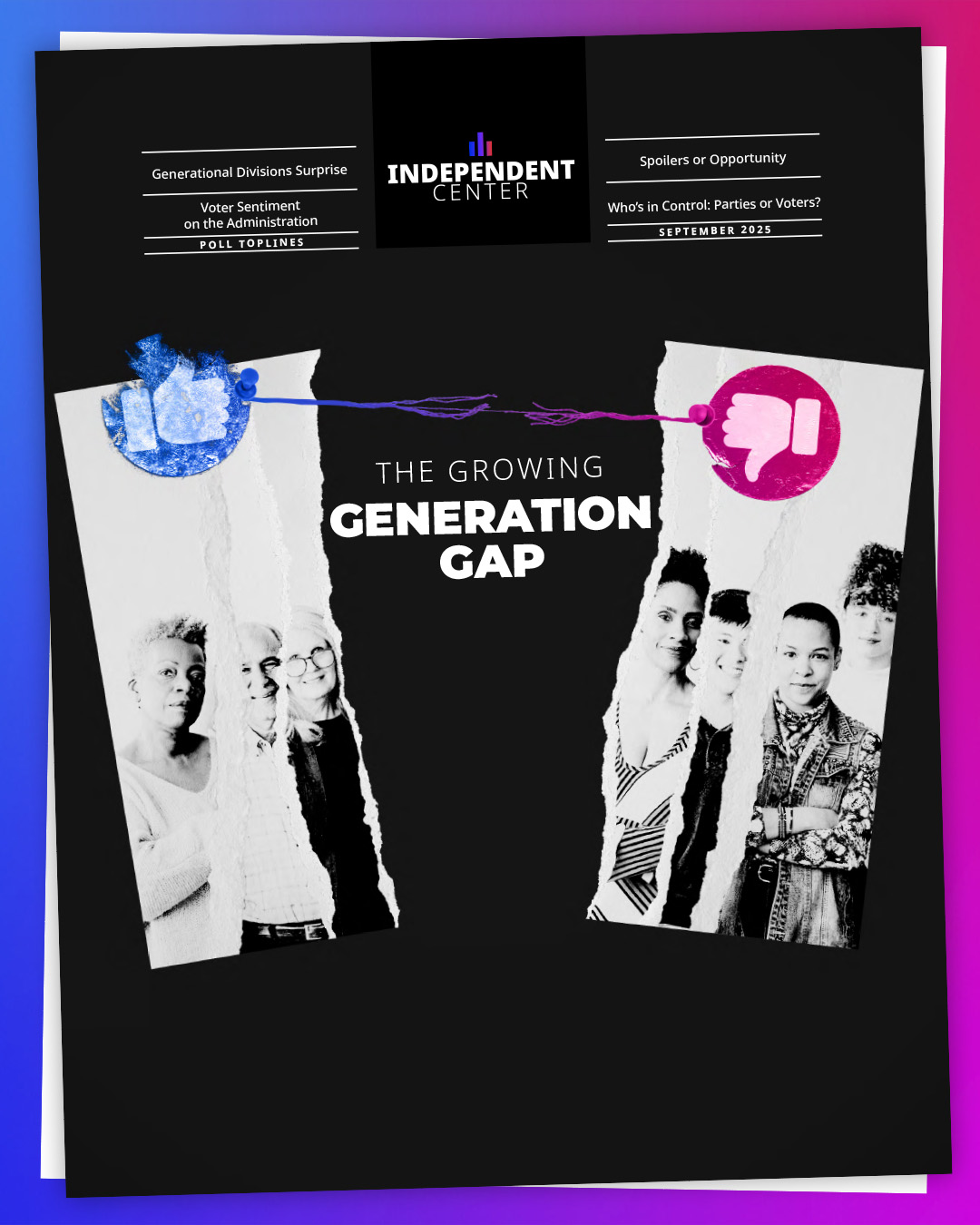The Independent Center conducted focus group studies in Detroit. These are the findings.
Focus Group Overview
Group 1: Independent-Lean-Republican | 5:30PM ET

Demographics:
- 5 Female, 5 Male
- Registered to vote
- Very likely, or somewhat likely, to vote
- Does not plan on voting exclusively R or D
- Does not Strongly Approve nor Strongly Disapprove of the job President Trump is doing
Affiliate as:
- Not so strong Republican,
- Independent leaning Republican,
- Independent, or
- Independent leaning Democrat
Group 2: Independent-Lean-Democratic | 7:30PM ET

Demographics:
- Registered to vote
- Very likely, or somewhat likely, to vote
- Does not plan on voting exclusively R or D
- Does not Strongly Approve nor Strongly Disapprove of the job President Trump is doing
Affiliate as:
- Not so strong Democrat,
- Independent leaning Democrat,
- Independent, or
- Independent leaning Republican
Sentiment on Direction of the Country and Elected Officials
In this section, we asked voters ‘top-of-mind’ perception of:
- The American Dream
- Most important issue
- Sentiment on elected officials
- The idea of straight vs. split-ticket voting
- Ideal elected official qualities
Content Testing
We then showed each group four pieces of political content:
- A Jacky Rosen 2024 ad
- A current Immigration and Customs Enforcement flyer
- A current Trump inflation ad
- A Dan Osborn 2024 ad
Content Creation
We then broke each focus group into teams of two, giving them the task of creating their own political ad. Participants were tasked with crafting political ads directed at elected officials, emphasizing the most pressing concerns that leaders need to address.
Sentiment on Direction of the Country and Elected Officials
“The American Dream is alive, but going through a transition period”
Participants expressed growing concerns about economic instability, with inflation leading many to question the attainability of the American Dream. The burden of student loans, health care costs, and groceries emerged as major factor shaping their perception of America’s future.
While some had hesitations about their own well-being or the ability for people to attain the ‘American Dream’, many believed that it is simply going through a transitionary period marred by political turmoil.
“Just be authentic. We can catch both sides on the internet lying. That’s why no one cares anymore.”
There is widespread distrust in political institutions, with participants citing a lack of accountability and ineffective checks and balances. Community values play a significant role in shaping political perspectives, as upbringing and local standards influence beliefs and voting choices. Many feel disillusioned with the political climate, frustrated by the lack of meaningful change and feeling disconnected from the system.
“They need to work on issues together and listen to the people.”
Political polarization was at the forefront of both groups, with respondents stating the issue is creating deep divisions that have significantly weakened public trust in institutions, leaders, and governance. As ideological conflicts become more pronounced, elected officials and political groups often resort to divisive rhetoric, reinforcing an us-versus-them mentality that alienates opposing perspectives. This climate of hyper-partisanship is seen as leading to gridlock in policymaking, where meaningful legislative progress frequently stalls due to partisan loyalty overriding pragmatic solutions.
Clip Testing
Jacky Rosen Campaign Ad

✔ WHAT WORKS
Several respondents in both groups said they would be more likely to support a candidate like her after seeing this ad. Why?
- “She seems relaxed and bipartisan, which is good.”
- “Seems like she’d listen to the people – when she pointed out that she stood up to her leaders”
While she may have “hit the talking points” many in both groups were skeptical of her follow-through.
✖ WHAT MISSES THE MARK
The authenticity angle missed the mark with a variety of voters, actually becoming a negative.
- “Classic boomer politician. Telling you what you want to hear.”
- “Good marketing, but bullshit. She’s probably like everyone else out there.”
- “She sounded corny and staged.”
Immigration Flyer

✔ WHAT WORKS
Multiple respondents in both groups found aspects of this flyer that spoke to them:
- “[I] don’t mind the part of people coming across the border. We got our own weeds in our backyard, so inviting others is not good.”
But many thought it went past the pale:
- “[I] like that it’s aggressive, but it’s on the wrong things; Immigration and drugs, fine. Not ideas.”
✖ WHAT MISSES THE MARK
The negative slant toward stopping ideas and using the pronoun it for the word people was a red line for many.
- “What’s wrong with ideas? We should be open minded.”
- “America is built on ideas from somewhere else: Europe, Africa, Asia, so no, [I] don’t agree with that.”
- “People aren’t an “it” -- that demeans people.”
Trump ‘Frivolous Lawsuit’ Inflation Ad

✔ WHAT WORKS
Not much of this ad worked. People were more confused and turned off by the rhetoric than engaged.
✖ WHAT MISSES THE MARK
Respondents had a litany of negatives for this ad, from the tone to the message. They found this to be the type of ad that causes political rifts.
- “[I] Haven’t seen anything get more affordable – can’t blame past president with this as the fix.”
- “Ridiculous. What if it was a person had a legitimate claim against a hospital or doctor and they lose?”
- “They mentioned the inflation under Biden as part of Covid. But wasn’t Trump’s decision to get rid of epidemiology team, which was started by Clinton and expanded under Bush [and] Obama. Maybe couldn’t have stopped it, but …”
This ad drew confused looks from both groups, not sure how one claim related to another. The ad started with an ominous tone that visibly turned people off.
Dan Osborn Campaign Ad

✔ WHAT WORKS
This ad hit the mark for most people. While there were a couple negative remarks, by and large this is the type of candidate respondents were looking to support.
- “Seems like he’s able to empathize.”
- “[I] like that he says he’s Independent -- he’s not owned by a party and can see both sides.”
- “That he won’t caucus with any major party.”
- “Osborn is big coach from Nebraska. He said he stands for Nebraska. Nebraska colors, red and white, corn, moving heavy equipment. I thought it was a smart ad -- people aren’t voting for issues, [they’re] voting for heart.”
✖ WHAT MISSES THE MARK
Not much of this ad missed the mark. People liked the tone and message, the few issues that did come up in both groups when probing for a negative related to substance and blaming Washington.
- “Said nothing about his views.”
- “[He] just blamed all issues on Washington.”
‘Ideal Messaging’ Progression
Ten groups of two people each spent 5 to 10 minutes crafting an ideal message for elected officials to hear. These are the themes that unified the messages they created:

Final Thoughts
“Red vs. Blue” Matters Less Than “Authentic and True”
No group attributed government dysfunction to any single political party. Instead, people expressed a desire for authentic leaders, free from political agendas, to address the issues that they as Americans care about.
Improving government efficiency isn’t a task for one party alone—framing it as a partisan issue risks alienating people and making them believe the conversation is driven by political motives rather than genuine concern.
Common Ground and Civil Conversations Work
At the close of each group, we asked respondents their main takeaway from the focus group. By far, respondents believed that finding common ground is crucial for allowing individuals with diverse viewpoints to collaborate effectively. Non-partisan rhetoric encourages more constructive conversations, bridging divides and inspiring meaningful change.
These respondents recognized that they could come together, with different viewpoints, and solve more in a focus group facility than what elected officials can do in a capitol building because they are not constrained by partisan, divisive rhetoric.
AI Transcript Analysis
Sentiment on Direction of the Country and Elected Officials
- …economic uncertainty, student loan burdens, and distrust in political institutions are shaping public perceptions.
- Many participants expressed frustration with the current political climate, feeling disconnected from meaningful change.
- Rising political polarization further fuels skepticism toward government accountability, reinforcing the widespread perception of institutional inadequacy.
Content Testing
- Voters are increasingly demanding authentic political communication, expressing frustration with scripted rhetoric and seeking transparency from candidates.
- There was a large amount of support for independent candidates, with many wanting alternatives to the traditional two-party system.
- …both groups cited was a need for political collaboration, as they call for leaders to prioritize problem-solving over partisanship. There was a noticeable push for practical governance, with voters advocating for effective leadership that transcends political divides.
Content Creation
- ….distrust of the government and bureaucracy, seeing them as inefficient, overly complex, or driven by special interests rather than the needs of ordinary citizens.
- …they first have to be assured that the agency is transparent and trustworthy - not bought and paid for by partisan brokering.





